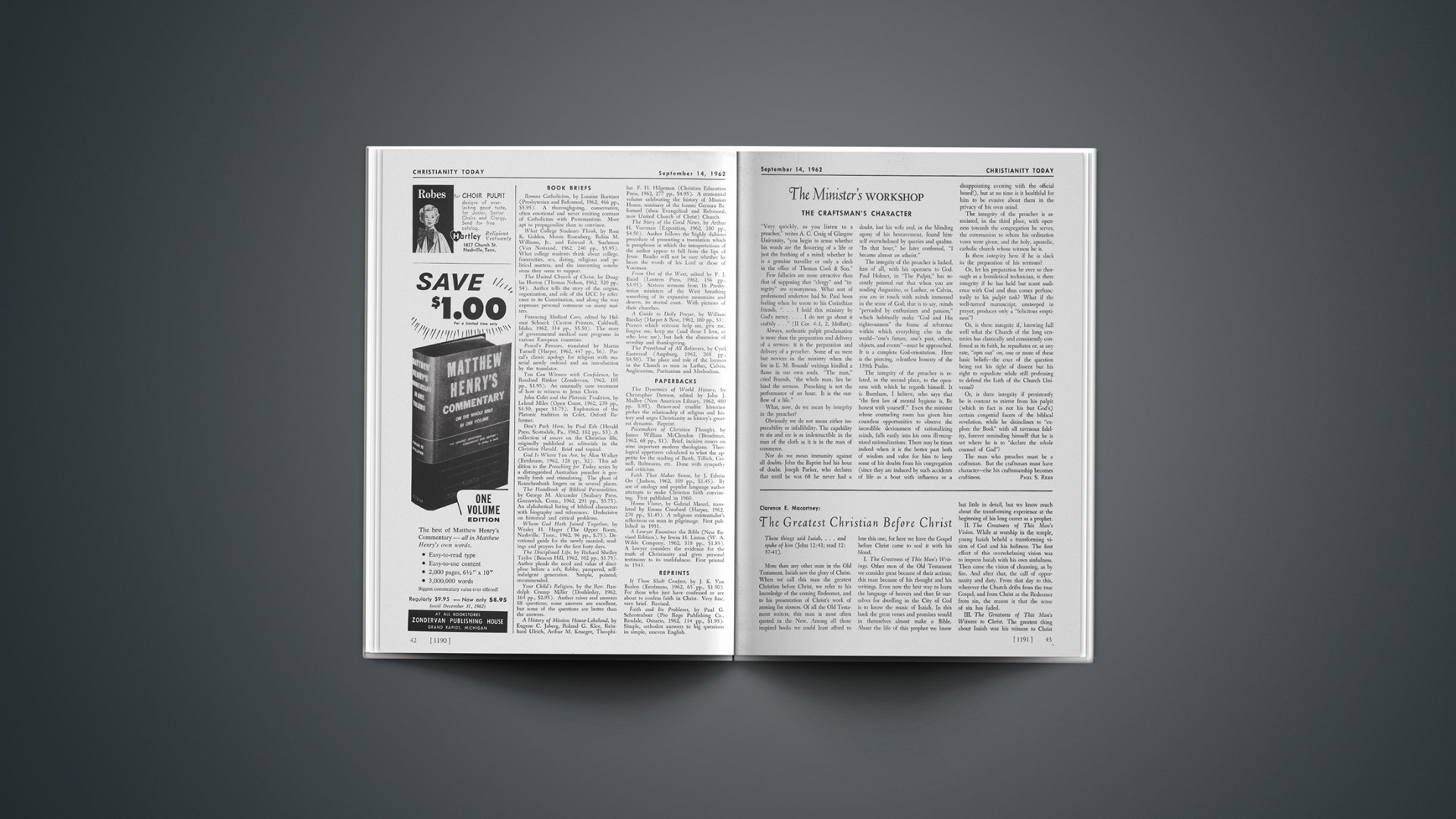“Very quickly, as you listen to a preacher,” writes A. C. Craig of Glasgow University, “you begin to sense whether his words are the flowering of a life or just the frothing of a mind; whether he is a genuine traveller or only a clerk in the office of Thomas Cook & Son.”
Few fallacies are more attractive than that of supposing that “clergy” and “integrity” are synonymous. What sort of professional undertow had St. Paul been feeling when he wrote to his Corinthian friends, “… I hold this ministry by God’s mercy.… I do not go about it craftily …” (2 Cor. 4:1, 2, Moffatt).
Always, authentic pulpit proclamation is more than the preparation and delivery of a sermon: it is the preparation and delivery of a preacher. Some of us were but novices in the ministry when the fire in E. M. Bounds’ writings kindled a flame in our own souls. “The man,” cried Bounds, “the whole man, lies behind the sermon. Preaching is not the performance of an hour. It is the outflow of a life.”
What, now, do we mean by integrity in the preacher?
Obviously we do not mean either impeccability or infallibility. The capability to sin and err is as indestructible in the man of the cloth as it is in the man of commerce.
Nor do we mean immunity against all doubts. John the Baptist had his hour of doubt. Joseph Parker, who declares that until he was 68 he never had a doubt, lost his wife and, in the blinding agony of his bereavement, found himself overwhelmed by queries and qualms. “In that hour,” he later confessed, “I became almost an atheist.”
The integrity of the preacher is linked, first of all, with his openness to God. Paul Holmer, in “The Pulpit,” has recently pointed out that when you are reading Augustine, or Luther, or Calvin, you are in touch with minds immersed in the sense of God; that is to say, minds “pervaded by enthusiasm and passion,” which habitually make “God and His righteousness” the frame of reference within which everything else in the world—“one’s future, one’s past, others, objects, and events”—must be approached. It is a complete God-orientation. Here is the piercing, relentless honesty of the 139th Psalm.
The integrity of the preacher is related, in the second place, to the openness with which he regards himself. It is Burnham, I believe, who says that “the first law of mental hygiene is, Be honest with yourself.” Even the minister whose counseling room has given him countless opportunities to observe the incredible deviousness of rationalizing minds, falls easily into his own ill-recognized rationalizations. There may be times indeed when it is the better part both of wisdom and valor for him to keep some of his doubts from his congregation (since they are induced by such accidents of life as a bout with influenza or a disappointing evening with the official board!), but at no time is it healthful for him to be evasive about them in the privacy of his own mind.
The integrity of the preacher is associated, in the third place, with openness towards the congregation he serves, the communion to whom his ordination vows were given, and the holy, apostolic, catholic church whose witness he is.
Is there integrity here if he is slack in the preparation of his sermons?
Or, let his preparation be ever so thorough as a homiletical technician, is there integrity if he has held but scant audience with God and thus comes perfunctorily to his pulpit task? What if the well-turned manuscript, unsteeped in prayer, produces only a “felicitous emptiness?
Or, is there integrity if, knowing full well what the Church of the long centuries has classically and consistently confessed as its faith, he repudiates or, at any rate, “opts out” on, one or more of these basic beliefs—the crux of the question being not his right of dissent but his right to repudiate while still professing to defend the faith of the Church Universal?
Or, is there integrity if persistently he is content to mirror from his pulpit (which in fact is not his but God’s) certain congenial facets of the biblical revelation, while he disinclines to “explore the Book” with all ravenous fidelity, forever reminding himself that he is set where he is to “declare the whole counsel of God”?
The man who preaches must be a craftsman. But the craftsman must have character—else his craftsmanship becomes craftiness.










